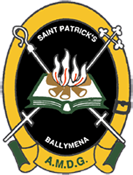Mathematics
| About our subject: The Mathematics department at St Patrick’s supports all pupils’ potential for achievement, providing them with a solid foundation of Mathematical skills, whilst promoting a sense of wonder about the beauty of Mathematics. “Mathematics is the alphabet with which God has written the universe” Galileo (1564 – 1642) The Mathematics Department at St Patrick’s will provide for all students’ mathematical experiences through spiritual, moral, cultural and social contexts – irrespective of their background, ability or race. These experiences should help the students to acquire the mathematical skills and understanding they need as they journey through life. Mathematics plays an important role in our lives. It is used in everyday activities such as buying food and clothes, keeping time and playing games. All students at St Patrick’s study Mathematics. We aim to provide a wide range of Mathematical experiences enabling students to: • acquire skills in Mathematical thinking; • develop confidence in using and applying Mathematics and to appreciate its challenges and aesthetic satisfaction within wider contexts; • develop positive attitudes to mathematics and an understanding of its nature and purpose in a variety of relevant contexts; • progress appropriately through a challenging programme of work differentiated to meet individual needs; • develop, initiate and enjoy working cooperatively, collaboratively and individually. Students are encouraged to develop their thinking skills and approaches to problem solving and enquiry using a range of techniques. The development of an understanding of number and its application, in particular the development of mental strategies and the use of appropriate language is a priority. Numeracy is promoted throughout the school by all teachers with the use of Numeracy Ninjas to help to consolidate mathematical skills and encourage the enjoyment of using mathematics in daily life. Mathematics is a creative and highly interconnected discipline that has been developed over centuries, providing the solution to some of history’s most intriguing problems. It is essential to everyday life, critical to science, technology and engineering, and necessary for financial literacy and most forms of employment. A high-quality mathematics education therefore provides a foundation for understanding the world, the ability to reason mathematically, an appreciation of the beauty and power of mathematics, and a sense of enjoyment and curiosity about the subject. The national curriculum for mathematics aims to ensure that all pupils: become fluent in the fundamentals of mathematics, including through varied and frequent practice with increasingly complex problems over time, so that pupils develop conceptual understanding and the ability to recall and apply knowledge rapidly and accurately reason mathematically by following a line of enquiry, conjecturing relationships and generalisations, and developing an argument, justification or proof using mathematical language can solve problems by applying their mathematics to a variety of routine and non-routine problems with increasing sophistication, including breaking down problems into a series of simpler steps and persevering in seeking solutions Mathematics is an interconnected subject in which pupils need to be able to move fluently between representations of mathematical ideas. The programmes of study are, by necessity, organised into apparently distinct domains, but pupils should make rich connections across mathematical ideas to develop fluency, mathematical reasoning and competence in solving increasingly sophisticated problems. They should also apply their mathematical knowledge to science and other subjects. The expectation is that the majority of pupils will move through the programmes of study at broadly the same pace. However, decisions about when to progress should always be based on the security of pupils’ understanding and their readiness to progress to the next stage. Pupils who grasp concepts rapidly should be challenged through being offered rich and sophisticated problems before any acceleration through new content. Those who are not sufficiently fluent with earlier material should consolidate their understanding, including through additional practice, before moving on.
|
Staff members:)
Mrs B. Hannon (HoD)
Mrs C. Harkins
Dr J. McAuley
Mr C. Lunnun

